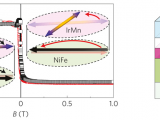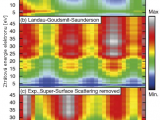Focused x-ray laser beam is capable of creating unique phases of matter; specifically very dense plasma yet with rather low temperature. Physicists call it warm dense matter (WDM). WDM can be created by optical lasers but only in very specific and restricted conditions. X-ray lasers, on the other hand, can be used for WDM creation in much broader variety of conditions because of their ability to warm up the whole volume of the energized matter and not only the surface as optical lasers do. WDM in space can be found in cores of giant planets (such as Jupiter) or another space objects (eg.
You are here
Significant results of scientific activity in year 2011
In collaboration with researchers from MFF UK3 and colleagues from United Kingdom and Japan we have introduced a new principle of an antiferromagnetic-based spintronic device and its implementation. Currently used spintronic elements in hard disk read-and-write heads or memory chips are based on ferromagnets. Electron spins tends to arrange themselves in one direction in ferromagnets which therefore work as a strong magnet.
Experiment H1 located at electron/positron-proton (ep) collider HERA in DESY Hamburg has collected currently the most precise measurements of cross-section of electron/positron scattered on protons. The scatter results informs us about the inner structure of protons. This scattering experiment is similar to famous alfa particle scattering on Au foil in 1909 which led to discovery of atomic nuclei (Rutherford's experiment). In case of electron-proton scattering we study the properties of point-like particles in proton, partons (quarks and gluons).
Quantum information processing offers potential for further progress of information technologies. Theoretical research in this field has already predicted a whole range of significant improvements which could be achieved by application of quantum physics instead of classic computing methods. It becomes apparent that the basic building blocks of future computers will be the so-called c-phase (controlled phase) gates. These gates process 2 bites of quantum information (qubits) and their function is similar to CNOT operation known from classic ICT.
D0 experiment has conducted new, more precise, measurements of the mass of top quark where the final system of top and anti-top quark decayal consists odf one lepton and jets. Measurements was performed in proton-antiproton collisions at the Tevatron Collider with center-of-mass energy 1,96 TeV. Resulting measured value mt=176,01±1,64 GeV is one of the most precise measurements of the mass of top quark in a separate terminal channel.
High biocompatibility, variable size ranging from ≈5 nm, stable luminescence from its color centers, and simple carbon chemistry for biomolecule grafting make nanodiamond (ND) particles an attractive alternative to molecular dyes for drug-delivery. A novel method is presented that can be used for remote monitoring of chemical processes in biological environments based on color changes from photoluminescent (PL) nitrogen-vacancy (NV) centers in ND.
Thanks to its special material properties and expected applications in nanotechnology the carbon materials has been recently a subject of an intensive research. Although the atomic resolution of an image from scanning electron microscope (SEM) can be achieved rather routinely, accurate measurement of positions of single atoms creating various carbon structures is very difficult. In collaboration with colleagues from Spain we have proved by detailed theoretical calculations that maximum contrast in images with atomic resolution may not correspond with individual atoms.
Significance of thin layers of ferromagnetic semiconductors (Ga,Mn)As for applications in spintronics is based on their magnetocrystalline anisotropy. While the orientation of an easy magnetic axis along the layer plane and its change to normal direction in case of Bravais lattice deformation is well understood, the origin of surface uniaxial anisotropy, that means non-equivalence of [110] and [¯110] directions, has not been resolved yet. In this work we explained possible microscopical mechanism of this effect.









